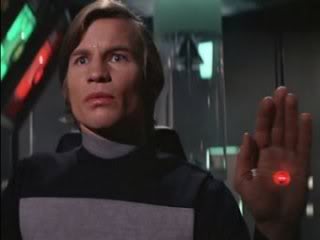Reboots uniting parents and children: pop-cultural apologism
27.04.10
I’ve often wondered if remakes and reboots are timed about a generation apart in order to hit two demographics at once. Parents and children agreeing to see the same movie because the parents grew up with it and now it’s marketed to the kids as the summer blockbuster. The average childbearing age for women in the U.S. circa the 2000 census was 25.1
 years old. Not sure what it is for fathers. Two years older? A popular industry buzzword at the moment is the “four quadrant film” — a movie that covers four basic segments: young, old, male, female — and a sequel would seem to take care of at least two of those.
years old. Not sure what it is for fathers. Two years older? A popular industry buzzword at the moment is the “four quadrant film” — a movie that covers four basic segments: young, old, male, female — and a sequel would seem to take care of at least two of those.
Does 25 years do it? Tron was first released in 1982, plus 25 years is 2007 and will be released in December of this year. Transformers were originally launched in 2004, making the parentally optimum reboot year 2009. It actually landed in 2007. Star Wars: 1977 + 25 = 2002. Actual reboot: 1999. It makes me think of Logan’s Run out (1976) with the blinking crystal in the hand after 30 years. Do movies begin blinking after 25 years ready to be rebooted? Ech. Well, the truth is I had to be pretty picky in my data collecting. For example the remake of Logan’s Run itself will come out in 2012.
It all reminds me of the Simpsons episode in which Bart desperately wants to see the Itch
y and Scratchy movie and after he repeatedly misbehaves Homer forbids him from going and Bart despairs as every other ki
d from his class watches the film. The episode concludes years and years later in a futuristic city in which an aged Homer and an adult Bart walk past a rep theater where the film is playing, decide to go inside and happily watch it.

So while the remake is not the most inventive of movies, there’s something a bit like oral storytelling about it. The story gets repeated from one generation to another, each time with some changes. My own father is convinced
that demographic marketing actually serves to distance generations and groups from each other. By separating out the market groups, the media actually further separates social groups its targeting. (Thomas Frank’s excellent Conquest of the Cool talks a bit about this and how the prototypical 1960s generational conflict is necessary to and eternally recapitulated by, um, do we still call it Madison Avenue?) Reboots would seem to be an occasion in which young and old unite around a shared item of media and an old story is retold. -BB